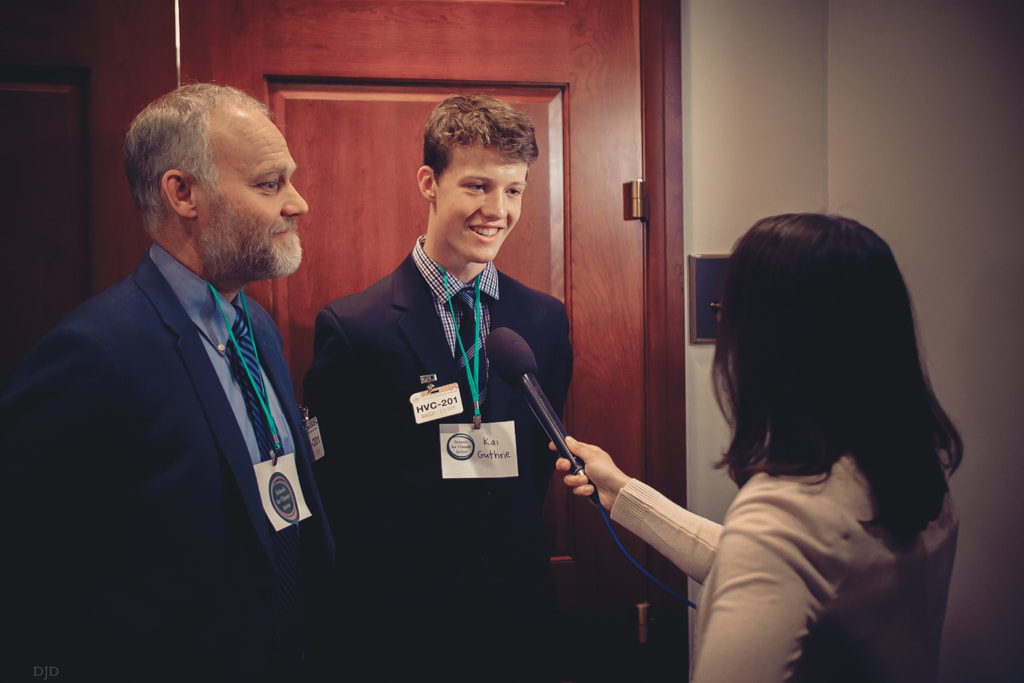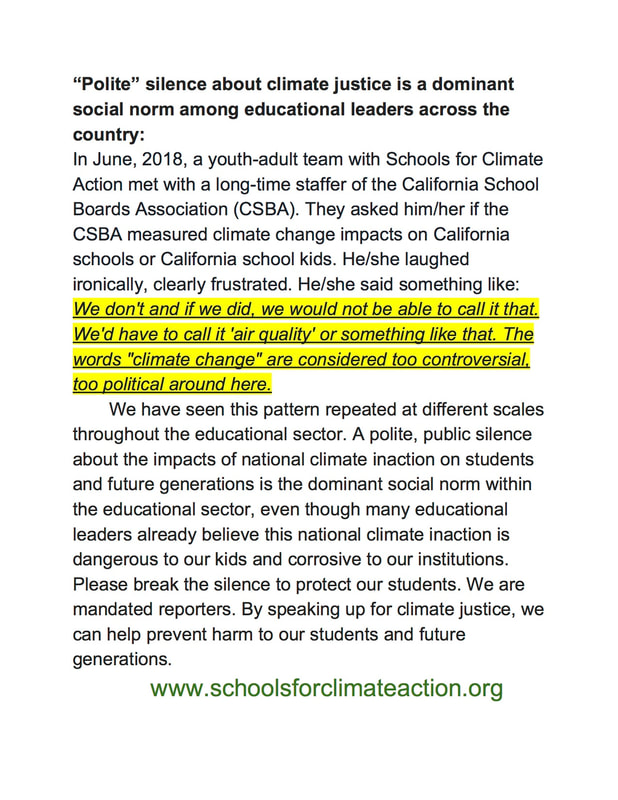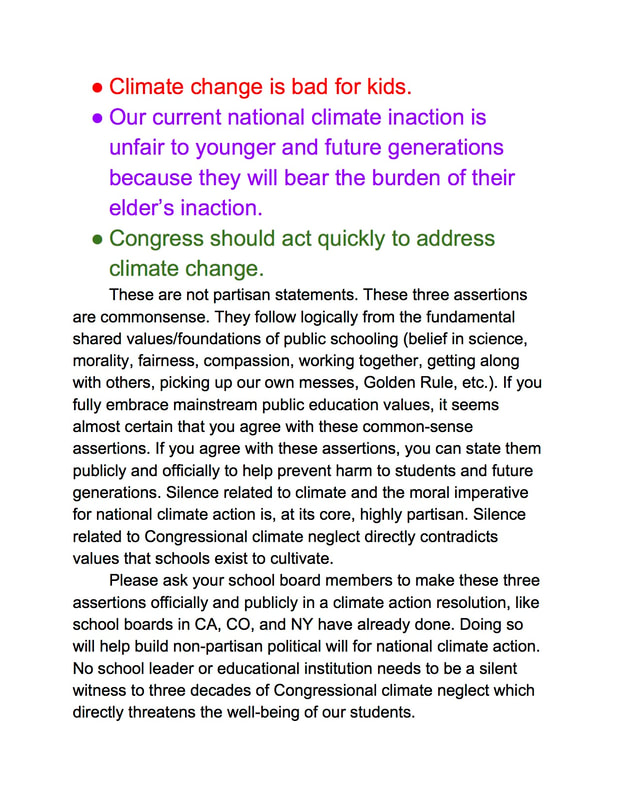SCHOOLS FOR CLIMATE ACTION
|
On September 20th, the Santa Cruz County Office of Education became the 24th school board to speak up for climate action to protect students. There are now 27 school boards, including 4 county office of education school boards (Sonoma, Marin, Santa Cruz, and San Mateo) that have joined the campaign. The social norm of climate silence among educational leaders is starting to flip. The harm caused by national climate inaction is clear. Congress can act on climate to protect our students. All 90,000 school board members across the nation can speak up in respectful, non-partisan, but assertive climate action resolutions to protect students. School stakeholders across the country engage their local, county, and state school board members to be a clear voice for commonsense climate action to protect students. These resolutions are an expression of love, respect, and care for students and future generations. Thank you for Santa Cruz County Office of Education trustees and Superintendent Watkins.
0 Comments
Very exciting news. The National School Boards Association (NSBA) may be considering this climate action resolution very soon (also pasted below). This would create a realistic and rapid path to thousands of local climate action resolutions from school boards across the country. This, in turn, would help move Congress to finally act on climate change to protect our young people. We need to be sure to be very respectful of the NSBA. They do tremendous work fighting for better conditions for schools and school kids across the country, often at great odds. To some extent, it's probably exhausting for them to be asked to take this on as well---they already have so many pressing priorities.
1. Please send 100% supportive and positive emails to the NSBA board of directors: Here is a template email you could share with school stakeholders in your networks (parents, students, teachers, and especially school board members). Please encourage school stakeholders to email the NSBA directly at [email protected] (Marsha Bernard is the executive assistant for the NSBA board). Please cc "[email protected]" so we can track outreach. "Dear National School Boards Association: Thank you for all of your important work supporting great public schools for kids and communities across America. I believe American public schools are one of our most vital public institutions. As a supporter of the non-partisan, grassroots, youth-adult Schools for Climate Action campaign, I was happy to learn that the National School Boards Association was considering a non-partisan climate action resolution. I think it is so important that Congress hear from educational leaders detailing the risks and harm of climate inaction on American kids and schools. There are many positive steps Congress can pursue to help mitigate the impact of climate change for American young people. Thank you for encouraging Congress to show leadership on this issue. I am a ____________________ (insert school stakeholder category---parent-teacher-student-school board member, etc.) in _______________ district in __________ (city, state). Thanks again for all of your work. Sincerely, _______________ 2. Outreach to Individual Directors by School Board Members or Top-Level School Stakeholders (Parents-students-educators) It would also be helpful for top-level school stakeholders (schoolboard members-students-teachers-parents) to reach out to the NSBA directors from their regions. Here is the NSBA director webpage. The more school board members and top-level school stakeholders these NSBA directors hear from, the better. 3. Other: I don't have all of the details about when this resolution will be considered by the full board. The NSBA is a private association so it does not necessarily publish board agendas, minutes, etc. We need to be sure to be very respectful of the NSBA. They do tremendous work fighting for better conditions for schools and school kids across the country, often at great odds. To some extent, it's probably exhausting for them to be asked to take this on as well---they already have so many pressing priorities. The NSBA represents all 50 state boards of education which in turn represent 14,000 school boards across the country. This would be a game changer if the NSBA passed this proposed climate action resolution. It would make it possible that thousands of school boards would pass their own climate action resolutions fairly quickly. This could help drive a society-wide paradigm shift about the way we perceive and react to climate change. I think it makes the most sense to write 100% supportive and positive messages to the National School Boards Association about this draft resolution. This resolution does not cite carbon-pricing specifically, but it does call on Congress to act. To me, it makes sense not to advocate for any wording changes, but simply to encourage them to pass their proposed resolution. I don't think we need to get too specific about policy on this one. Please contact me if you want more information about this. At least one significant county school board in California tried to pass a climate action resolution, but it was voted down because it was too specific policy-wise. Certainly, the board agreed that Congress should be acting on climate, but they did not feel they had the expertise to choose between common-sense policy options. Thanks everyone for all of your support and your work helping the educational sector speak up for a safe climate for our students. Cheers, Park Proposed Resolution “NSBA recognizes and understands the significant negative impact that rapid and ongoing climate change has on America’s schools, students, and their communities. NSBA urges the Congress and administration of the United States to provide mitigation for the effects on our communities. Specifically, NSBA advocates for funding for school infrastructure needs and emergency funding for disaster relief caused by natural catastrophes and extreme weather events. Furthermore, NSBA urges a reduction of carbon emissions and an increase in carbon-free electricity production to slow the rapid progression of climate change and its effects on America’s schools, students and communities. Additionally, NSBA encourages states to adopt a curriculum that addresses the challenges that climate change puts on our communities and equip students with the knowledge necessary to slow such changes.” Rationale Research demonstrates that climate change adversely effects students’ physical and mental health and negatively impacts student achievement. The damages caused by natural catastrophes and extreme weather events devastate local economies and therefore schools. In 2017, the Government Accounting Agency reported that the impact of climate change to the United States was approximately $350 billion for the preceding 10 years, and is projected to cost at least $35 billion annually from now until 2050 when it will increase to as much as $112 billion annually by the end of the century. A report by the Universal Ecological Fund places the annual cost at $240 billion. These figures did not include the devastating California wildfires of 2017/2018, the destruction caused by Hurricane Harvey in South Texas, loss of Alaskan permafrost and coastal land mass, significant droughts in the western United States, increases in insect population growth leading to destruction of crops, and projected loss of low lying land in Florida, Virginia, Texas, California, and Louisiana. Research by the World Meteorological Organization concluded that 80 percent of natural disasters between 2005 and 2015 were in some way climate related. The insurance industry has recognized the impact of climate change. In 2010 the National Association of Insurance Commissioners (NAIC) adopted an Insurer Climate Risk Disclosure Survey in response to The Potential Impact of Climate Change on Insurance Regulation white paper released by the NAIC in 2008. “The disclosure of climate risk is important because of the potential impact climate change can have on insurer solvency and the availability and affordability of insurance across all major categories.” In addition to the projected costs due to major flooding effecting coastal schools, there will be increased electricity demands due to heat and air quality for inland schools requiring increasing amounts of air conditioning and possible indoor gyms for physical education and athletics. The specific costs to school infrastructure including the loss of buildings and lands as well as declines in tax revenue and increases in insurance rates has not been determined, however it is expected to be billions of dollars. It is vital that climate change be slowed so that school districts and their communities can spend precious dollars in classrooms to support the students of today and for future generations. S4CA Congress, Act on Climate! Day~March 28th, 2019 (Click here for continually update information)
Congress, Act on Climate! Day 2019 On a single day in March, 2019, youth-adult teams representing school districts and student councils from across the country will hand-deliver scores (?hundreds/thousands?) of climate action resolutions to every Member of Congress. These resolutions will send a clear, unified, and non-partisan message that the educational sector believes Congress has a moral imperative to act swiftly and effectively on climate change to limit harm to students and future generations. School districts, educational leaders, and school communities will no longer be silent witnesses to continued Congressional climate neglect. Note: All information is currently tentative. We hope to finalize dates by December of 2018. We will finalize numbers in January of 2019. Details:
Next Steps: If you are interested in participating or supporting a youth-adult team from your school district, please email Schools for Climate Action lead volunteer Park Guthrie at [email protected]. Tentative Timeline Agenda: October/November, 2018 Initial commitment/rough numbers December, 2018 Firm commitment and first virtual planning meeting Teams gather additional district resolutions (student councils, PTAs, educators’ unions) and start local fundraising. January, 2019 2nd virtual planning meeting. February, 2019 Pre-visit webinar: Delivery Day Logistics and Scripts March, 2019 Wednesday, March 27th In-person prep meetings and some Member of Congress meetings. Thursday, March 28th Hand-deliver school board and student council climate action resolutions to all 535 Representatives and 100 Senators Friday, March 28th Teams meet with Members of Congress or School Support Organization Headquarters (Ex: National School Boards Association, American Federation of Teachers, National Association of School Psychologists, etc.) Fairfax County School Board Passes Resolution on Climate Change Action
At its business meeting on October 11, the Fairfax County School Board passed the following resolution: RESOLUTION OF THE FAIRFAX COUNTY SCHOOL BOARD CALLING FOR STATE AND FEDERAL ACTION ON CLIMATE CHANGE WHEREAS, an overwhelming majority of credentialed scientists, in the U.S. and abroad, support the finding that climate change is happening and that human activity is a key contributor; and WHEREAS, if left unaddressed, the consequences of climate change will harm all Americans, most especially children and those living in poverty, and saddle future generations with the costly burden of a dangerously damaged planet; and WHEREAS, climate instability is a global challenge requiring bold, innovative, and sustained actions at all levels of government, local, state, and federal; and WHEREAS, the size of Fairfax County Public Schools’ physical footprint provides an unparalleled opportunity to advance the use of renewable energy sources and reduce greenhouse gas output in Northern Virginia; and WHEREAS, pursuant to School Board Environmental Stewardship Policy 8542, FCPS leads the nation in energy efficiency, the development of green building design standards, and award-winning classroom opportunities for student advocacy and learning through the Get 2 Green program; and WHEREAS, the Fairfax County School Board’s commitment to the safety, well-being, and future success of all children in our community also demands a high priority on reducing carbon consumption in our decisions regarding capital improvement, energy use, transportation, and other policy priorities within the Board’s control; and WHEREAS, the Fairfax County School Board depends on committed partners in local, state, and federal government to realize our climate action goals, and recognizes the efforts and progress made to date, especially Fairfax County Government’s recently announced request for proposals for solar installations on public buildings, to include schools; NOW, THEREFORE, be it resolved that the Fairfax County School Board: 1) calls on the members of the Virginia General Assembly and the United States Congress to act boldly on climate change and provide a regulatory framework that removes barriers to progress on climate action and encourages the rapid replacement of fossil fuels with renewable energy technology; and 2) directs the Superintendent to report timely to the Board changes in state and federal policy that support the goal of reducing carbon consumption, along with staff proposals to make best use of those opportunities in facilities and transportation planning. “Recent reports from the United Nations Intergovernmental Panel on Climate Change are disconcerting and will have an impact on our students,” said School Board chair Karen Corbett Sanders. “The Board has been formally committed to leading the way in reducing our carbon footprint through energy conservation and incorporating renewable energy into our capital improvement plan. With this resolution, we recognize the need to work with our State and Federal policymakers to advance a similar policy framework that encourages citizens to embrace renewable energy.” On Anniversary of Sonoma County Firestorm, Credo High School Student Council Passes 1st Student Council Climate Action Resolution in the Nation
On October 9th, 2018 the Credo High School Student Council in Cotati, California passed the Call to Climate Action Resolution. This marks the first student council climate action resolution as part of the Schools for Climate Action (S4CA) campaign. Credo HS junior, Avery R. led the effort to pass the Call to Climate Action Resolution. She is a Credo HS student council member and President of the California Association of Student Councils, Region 3. S4CA is a grass-roots, non-partisan, youth-adult campaign with a mission to empower school communities to speak up for climate action in order to protect current and future students. Inspired by the work and methods of Citizens’ Climate Lobby, it was started by a team of students, parents, and teachers in Sonoma County, CA in July, 2017. Since December, 2017 25 school boards and now 1 student council have passed climate action resolutions. There are 14,000 school boards in the country and likely 20,000+ student councils. If just 10% of these pass climate action resolutions, it generate a groundswell that would help move Congress to end the 30 years of climate neglect which threatens our young people and future generations. Youth-adult teams with the S4CA campaign will hand-deliver the Credo High School Student Council resolution to every member of Congress in March of 2018. By then, scores or hundreds more student councils will have passed their own climate action resolution. The Credo High School Student Council Call to Climate Action Resolution is the strongest of all the S4CA resolutions. In it, Credo High School student leaders declare climate change a “generational justice and human rights issue” and endorse “equitable and effective carbon-pricing policies.” In addition, they encourage “other student councils, school district boards, county boards of education, state boards of education, and the board of the California School Board Association, and the board of the National School Board Association to all pass climate action resolutions similar to ours, calling on Congress to enact swift, fair, and effective climate policies in order to protect current and future students.” For more information about Schools for Climate Action, please contact Park Guthrie at [email protected] or (510) 691-5051 or visit our website at www.schoolsforclimateaction.weebly.com Facebook: https://www.facebook.com/schoolsforclimateaction/ Twitter: https://twitter.com/Schools4Climate The San Mateo County Office of Education became the 25th school board (and 3rd county board) to pass a resolution building non-partisan political will for climate action and stating that climate change harms students. Here is the text:
San Mateo COE Resolution Unfortunately, it did not include language calling specifically on Congress to act, but hopefully as more and more educational leaders break the silence about national climate neglect, the language can become stronger and more efficient at moving Congress. It does however include language calling for climate leadership from "elected officials". We are grateful that the San Mateo educational leaders spoke up. We are eager for 89,900 other school board members---the only elected leaders with a singular focus on the well-being and future success of young people---to join them. No educational leader should be a silent witness to national climate neglect which so harms our students and undermines our institutional coherence. Thank you San Mateo County Office of Education Board Members and Superintendent for speaking up. |
Authors
Kai Guthrie is a ninth grade student at Credo High in Rohnert Park, a Citizens' Climate Lobby volunteer, and one of the founders of Schools for Climate Action campaign. Archives
December 2019
Categories |



 RSS Feed
RSS Feed
